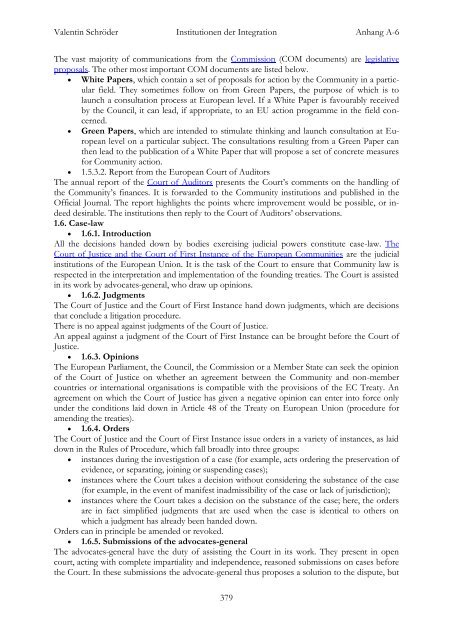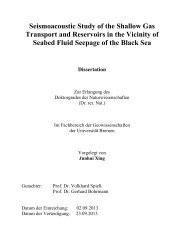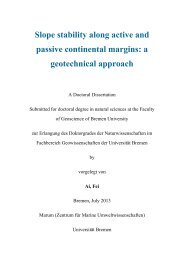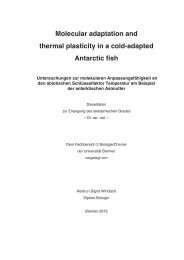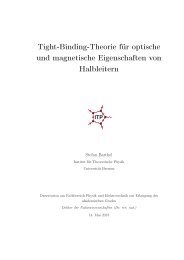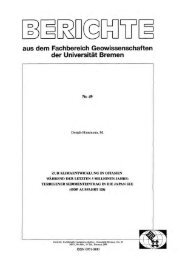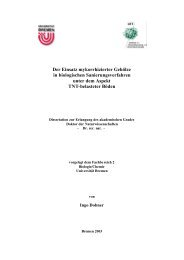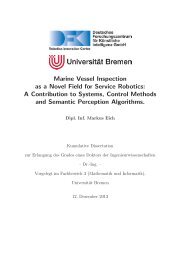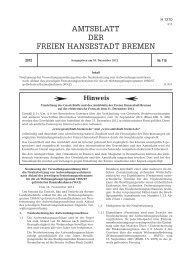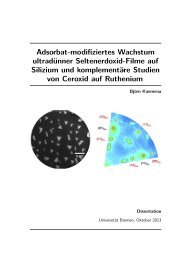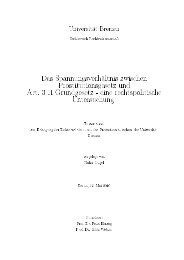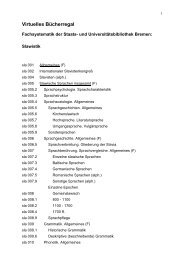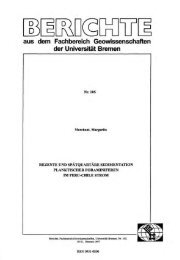- Seite 1:
Institutionen der Integration Ratsp
- Seite 4 und 5:
II Theoretischer Teil 4 Ratspräsid
- Seite 6 und 7:
Tabellenverzeichnis 6.1 Auszahlunge
- Seite 8 und 9:
Abbildungsverzeichnis 2.1 Einordnun
- Seite 10 und 11:
Vorwort Am Anfang meiner Beschäfti
- Seite 12 und 13:
habe ich mich im Zuge der Ausformul
- Seite 15 und 16:
Valentin Schröder Institutionen de
- Seite 17 und 18:
Valentin Schröder Institutionen de
- Seite 19 und 20:
Valentin Schröder Institutionen de
- Seite 21 und 22:
Valentin Schröder Institutionen de
- Seite 23 und 24:
Valentin Schröder Institutionen de
- Seite 25 und 26:
Valentin Schröder Institutionen de
- Seite 27 und 28:
Valentin Schröder Institutionen de
- Seite 29 und 30:
Valentin Schröder Institutionen de
- Seite 31 und 32:
Valentin Schröder Institutionen de
- Seite 33 und 34:
Valentin Schröder Institutionen de
- Seite 35 und 36:
Valentin Schröder Institutionen de
- Seite 37 und 38:
Valentin Schröder Institutionen de
- Seite 39 und 40:
Valentin Schröder Institutionen de
- Seite 41 und 42:
Valentin Schröder Institutionen de
- Seite 43 und 44:
Valentin Schröder Institutionen de
- Seite 45 und 46:
Valentin Schröder Institutionen de
- Seite 47 und 48:
Valentin Schröder Institutionen de
- Seite 49 und 50:
Valentin Schröder Institutionen de
- Seite 51 und 52:
Valentin Schröder Institutionen de
- Seite 53 und 54:
Valentin Schröder Institutionen de
- Seite 55 und 56:
Valentin Schröder Institutionen de
- Seite 57 und 58:
Valentin Schröder Institutionen de
- Seite 59 und 60:
Valentin Schröder Institutionen de
- Seite 61 und 62:
Valentin Schröder Institutionen de
- Seite 63 und 64:
Valentin Schröder Institutionen de
- Seite 65 und 66:
Valentin Schröder Institutionen de
- Seite 67 und 68:
Valentin Schröder Institutionen de
- Seite 69 und 70:
Valentin Schröder Institutionen de
- Seite 71 und 72:
Valentin Schröder Institutionen de
- Seite 73 und 74:
Valentin Schröder Institutionen de
- Seite 75 und 76:
Valentin Schröder Institutionen de
- Seite 77 und 78:
Valentin Schröder Institutionen de
- Seite 79 und 80:
Valentin Schröder Institutionen de
- Seite 81 und 82:
Valentin Schröder Institutionen de
- Seite 83 und 84:
Valentin Schröder Institutionen de
- Seite 85 und 86:
Valentin Schröder Institutionen de
- Seite 87 und 88:
Valentin Schröder Institutionen de
- Seite 89 und 90:
II Theoretischer Teil
- Seite 91 und 92:
Valentin Schröder Institutionen de
- Seite 93 und 94:
Valentin Schröder Institutionen de
- Seite 95 und 96:
Valentin Schröder Institutionen de
- Seite 97 und 98:
Valentin Schröder Institutionen de
- Seite 99 und 100:
Valentin Schröder Institutionen de
- Seite 101 und 102:
Valentin Schröder Institutionen de
- Seite 103 und 104:
Valentin Schröder Institutionen de
- Seite 105 und 106:
Valentin Schröder Institutionen de
- Seite 107 und 108:
Valentin Schröder Institutionen de
- Seite 109 und 110:
Valentin Schröder Institutionen de
- Seite 111 und 112:
Valentin Schröder Institutionen de
- Seite 113 und 114:
Valentin Schröder Institutionen de
- Seite 115 und 116:
Valentin Schröder Institutionen de
- Seite 117 und 118:
Valentin Schröder Institutionen de
- Seite 119 und 120:
Valentin Schröder Institutionen de
- Seite 121 und 122:
Valentin Schröder Institutionen de
- Seite 123 und 124:
Valentin Schröder Institutionen de
- Seite 125 und 126:
Valentin Schröder Institutionen de
- Seite 127 und 128:
Valentin Schröder Institutionen de
- Seite 129 und 130:
Valentin Schröder Institutionen de
- Seite 131 und 132:
Valentin Schröder Institutionen de
- Seite 133 und 134:
Valentin Schröder Institutionen de
- Seite 135 und 136:
Valentin Schröder Institutionen de
- Seite 137 und 138:
Valentin Schröder Institutionen de
- Seite 139 und 140:
Valentin Schröder Institutionen de
- Seite 141 und 142:
Valentin Schröder Institutionen de
- Seite 143 und 144:
Valentin Schröder Institutionen de
- Seite 145 und 146:
Valentin Schröder Institutionen de
- Seite 147 und 148:
Valentin Schröder Institutionen de
- Seite 149 und 150:
Valentin Schröder Institutionen de
- Seite 151 und 152:
Valentin Schröder Institutionen de
- Seite 153 und 154:
Valentin Schröder Institutionen de
- Seite 155 und 156:
Valentin Schröder Institutionen de
- Seite 157 und 158:
Valentin Schröder Institutionen de
- Seite 159 und 160:
Valentin Schröder Institutionen de
- Seite 161 und 162:
Valentin Schröder Institutionen de
- Seite 163 und 164:
Valentin Schröder Institutionen de
- Seite 165 und 166:
Valentin Schröder Institutionen de
- Seite 167 und 168:
Valentin Schröder Institutionen de
- Seite 169 und 170:
Valentin Schröder Institutionen de
- Seite 171 und 172:
Valentin Schröder Institutionen de
- Seite 173 und 174:
III Empirischer Teil
- Seite 175 und 176:
Valentin Schröder Institutionen de
- Seite 177 und 178:
Valentin Schröder Institutionen de
- Seite 179 und 180:
Valentin Schröder Institutionen de
- Seite 181 und 182:
Valentin Schröder Institutionen de
- Seite 183 und 184:
Valentin Schröder Institutionen de
- Seite 185 und 186:
Valentin Schröder Institutionen de
- Seite 187 und 188:
Valentin Schröder Institutionen de
- Seite 189 und 190:
Valentin Schröder Institutionen de
- Seite 191 und 192:
Valentin Schröder Institutionen de
- Seite 193 und 194:
Valentin Schröder Institutionen de
- Seite 195 und 196:
Valentin Schröder Institutionen de
- Seite 197 und 198:
Valentin Schröder Institutionen de
- Seite 199 und 200:
Valentin Schröder Institutionen de
- Seite 201 und 202:
Valentin Schröder Institutionen de
- Seite 203 und 204:
Valentin Schröder Institutionen de
- Seite 205 und 206:
Valentin Schröder Institutionen de
- Seite 207 und 208:
Valentin Schröder Institutionen de
- Seite 209 und 210:
Valentin Schröder Institutionen de
- Seite 211 und 212:
Valentin Schröder Institutionen de
- Seite 213 und 214:
Valentin Schröder Institutionen de
- Seite 215 und 216:
Valentin Schröder Institutionen de
- Seite 217 und 218:
Valentin Schröder Institutionen de
- Seite 219 und 220:
Valentin Schröder Institutionen de
- Seite 221 und 222:
Valentin Schröder Institutionen de
- Seite 223 und 224:
Valentin Schröder Institutionen de
- Seite 225 und 226:
Valentin Schröder Institutionen de
- Seite 227 und 228:
Valentin Schröder Institutionen de
- Seite 229 und 230:
Valentin Schröder Institutionen de
- Seite 231 und 232:
Valentin Schröder Institutionen de
- Seite 233 und 234:
Valentin Schröder Institutionen de
- Seite 235 und 236:
Valentin Schröder Institutionen de
- Seite 237 und 238:
Valentin Schröder Institutionen de
- Seite 239 und 240:
Valentin Schröder Institutionen de
- Seite 241 und 242:
Valentin Schröder Institutionen de
- Seite 243 und 244:
Valentin Schröder Institutionen de
- Seite 245 und 246:
. . Valentin Schröder Institutione
- Seite 247 und 248:
IV Konklusion
- Seite 249 und 250:
Valentin Schröder Institutionen de
- Seite 251 und 252:
Valentin Schröder Institutionen de
- Seite 253 und 254:
Valentin Schröder Institutionen de
- Seite 255 und 256:
Valentin Schröder Institutionen de
- Seite 257 und 258:
Anhang
- Seite 259 und 260:
Valentin Schröder Institutionen de
- Seite 261 und 262:
Valentin Schröder Institutionen de
- Seite 263 und 264:
Valentin Schröder Institutionen de
- Seite 265 und 266:
Valentin Schröder Institutionen de
- Seite 267 und 268:
Valentin Schröder Institutionen de
- Seite 269 und 270:
Valentin Schröder Institutionen de
- Seite 271 und 272:
Valentin Schröder Institutionen de
- Seite 273 und 274:
Valentin Schröder Institutionen de
- Seite 275 und 276:
Valentin Schröder Institutionen de
- Seite 277 und 278:
Valentin Schröder Institutionen de
- Seite 279 und 280:
Valentin Schröder Institutionen de
- Seite 281 und 282:
Valentin Schröder Institutionen de
- Seite 283 und 284:
Valentin Schröder Institutionen de
- Seite 285 und 286:
Valentin Schröder Institutionen de
- Seite 287 und 288:
Valentin Schröder Institutionen de
- Seite 289 und 290:
Valentin Schröder Institutionen de
- Seite 291 und 292:
Valentin Schröder Institutionen de
- Seite 293 und 294:
Valentin Schröder Institutionen de
- Seite 295 und 296:
Valentin Schröder Institutionen de
- Seite 297 und 298:
Valentin Schröder Institutionen de
- Seite 299 und 300:
Valentin Schröder Institutionen de
- Seite 301 und 302:
Valentin Schröder Institutionen de
- Seite 303 und 304:
Valentin Schröder Institutionen de
- Seite 305 und 306:
Valentin Schröder Institutionen de
- Seite 307 und 308:
Valentin Schröder Institutionen de
- Seite 309 und 310:
Valentin Schröder Institutionen de
- Seite 311 und 312:
Valentin Schröder Institutionen de
- Seite 313 und 314:
Valentin Schröder Institutionen de
- Seite 315 und 316:
Valentin Schröder Institutionen de
- Seite 317 und 318:
Valentin Schröder Institutionen de
- Seite 319 und 320:
Valentin Schröder Institutionen de
- Seite 321 und 322:
Valentin Schröder Institutionen de
- Seite 323 und 324:
Valentin Schröder Institutionen de
- Seite 325 und 326:
Valentin Schröder Institutionen de
- Seite 327 und 328:
Valentin Schröder Institutionen de
- Seite 329 und 330:
Valentin Schröder Institutionen de
- Seite 331 und 332:
Valentin Schröder Institutionen de
- Seite 333 und 334:
Valentin Schröder Institutionen de
- Seite 335 und 336:
Valentin Schröder Institutionen de
- Seite 337 und 338:
Valentin Schröder Institutionen de
- Seite 339 und 340: Valentin Schröder Institutionen de
- Seite 341 und 342: Valentin Schröder Institutionen de
- Seite 343 und 344: Valentin Schröder Institutionen de
- Seite 345 und 346: Valentin Schröder Institutionen de
- Seite 347 und 348: Valentin Schröder Institutionen de
- Seite 349 und 350: Valentin Schröder Institutionen de
- Seite 351 und 352: Valentin Schröder Institutionen de
- Seite 353 und 354: Valentin Schröder Institutionen de
- Seite 355 und 356: Valentin Schröder Institutionen de
- Seite 357 und 358: Valentin Schröder Institutionen de
- Seite 359 und 360: Valentin Schröder Institutionen de
- Seite 361 und 362: Valentin Schröder Institutionen de
- Seite 363 und 364: Valentin Schröder Institutionen de
- Seite 365 und 366: Valentin Schröder Institutionen de
- Seite 367 und 368: Valentin Schröder Institutionen de
- Seite 369 und 370: Valentin Schröder Institutionen de
- Seite 371 und 372: Valentin Schröder Institutionen de
- Seite 373 und 374: Valentin Schröder Institutionen de
- Seite 375 und 376: Valentin Schröder Institutionen de
- Seite 377 und 378: Valentin Schröder Institutionen de
- Seite 379 und 380: Valentin Schröder Institutionen de
- Seite 381 und 382: Valentin Schröder Institutionen de
- Seite 383 und 384: Valentin Schröder Institutionen de
- Seite 385 und 386: Valentin Schröder Institutionen de
- Seite 387 und 388: Valentin Schröder Institutionen de
- Seite 389: Valentin Schröder Institutionen de
- Seite 393 und 394: Valentin Schröder Institutionen de
- Seite 395 und 396: Valentin Schröder Institutionen de
- Seite 397 und 398: Valentin Schröder Institutionen de
- Seite 399 und 400: Valentin Schröder Institutionen de
- Seite 401 und 402: Valentin Schröder Institutionen de
- Seite 403 und 404: Valentin Schröder Institutionen de
- Seite 405 und 406: Valentin Schröder Institutionen de
- Seite 407 und 408: Valentin Schröder Institutionen de
- Seite 409 und 410: Valentin Schröder Institutionen de
- Seite 411 und 412: Valentin Schröder Institutionen de
- Seite 413 und 414: Valentin Schröder Institutionen de
- Seite 415: Valentin Schröder Institutionen de


